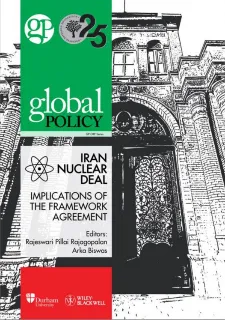Iran’s nuclear programme has been under intense scrutiny from the international community for more than a decade now, as the country continues to play its cards close to its chest and its nuclear intentions remain unclear. Its failure to declare all nuclear facilities and materials in a timely manner has raised suspicion among the major powers and within the non-proliferation community. In this third GP-ORF publication, however, the effort is not to find fault in any of the approaches taken so far; instead, this edited volume consists of nine chapters that deal with various aspects of the Iranian nuclear agreement reached on 2 April 2015.
Contents
- Introduction – Rajeswari Pillai Rajagopalan
- Assessment of Lausanne Framework Accord with Iran – Sheel Kant Sharma
Regional Responses
- From Reaction to Action: Framework Agreement and Gulf Responses – Kanchi Gupta
- From Lausanne to June 30th: Some New Messages from Israel – Emily B. Landau
Major Power Perspectives
- The United States’ Strategy of Engagement towards Iran – Sylvia Mishra and Uma Purushothaman
- Iran Nuclear Framework Agreement: A Russian Perspective – Petr Topychkanov
- The Long Road to Lausanne and the Way Forward for the EU with Iran – Britta Petersen
India and the Framework Agreement
- Iran Nuclear Framework Agreement: Impact on India’s Energy Calculations – Akhilesh Sati
- India’s Approach to the Iran Nuclear Framework Agreement – Arka Biswas
Global Non-Proliferation Regime
Impact on the Global Non-Proliferation Architecture – Rakesh Sood
Annexure
1. Joint Statement by EU High Representative Federica Mogherini and Iranian Foreign Minister Javad Zarif Switzerland
2. Parameters for a Joint Comprehensive Plan of Action Regarding the Islamic Republic of Iran’s Nuclear Program (White House Fact Sheet)
3. Iranian Fact Sheet on the Nuclear Negotiations (English Translation)
The views expressed above belong to the author(s). ORF research and analyses now available on Telegram! Click here to access our curated content — blogs, longforms and interviews.

 PDF Download
PDF Download



 PREV
PREV



